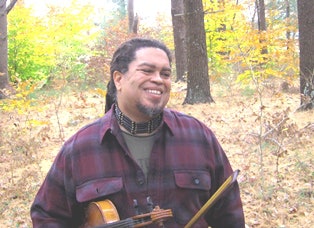 Morgan James Peters, or Mwalim, directs the African and African-American studies program at UMass Dartmouth.
Morgan James Peters, or Mwalim, directs the African and African-American studies program at UMass Dartmouth.
But Mwalim traces his ancestry not only to Africa, via Barbados, but also to North America — the first Native American tribe that encountered the Pilgrims in the 1600s. He says he embraces both parts of his racial-ethnic identity.
“My primary identity is I’m a Black Wampanoag,” Mwalim says. “It’s having a foot in both communities, being part of the Wampanoag community, being part of the Black community and recognizing that they’re not mutually exclusive.”
Many African-Americans claim some Native ancestry, often based on family oral history passed through the generations but frequently undocumented. Mwalim’s Native heritage is certain. He belongs to the Mashpee Wampanoag Tribe in Massachusetts.
His lineage represents a major source of Native ancestry in African-Americans — the Eastern tribes, according to Dr. J. Cedric Woods, director of the Institute for New England Native American Studies at the University of Massachusetts Boston.
“Most of the tribes have some degree or another of African intermixture,” says Woods, a member of the Lumbee Tribe of North Carolina. “It may be a single family line. It may be multiple lines. It may be most of the lines in the tribe. It can run the entire spectrum.”
Like Mwalim, people with that ancestral mix have begun to assert their identity more openly. In July, more than 400 Black American Indians attended the inaugural meeting of the National Congress of Black American Indians in Washington, D.C.




















